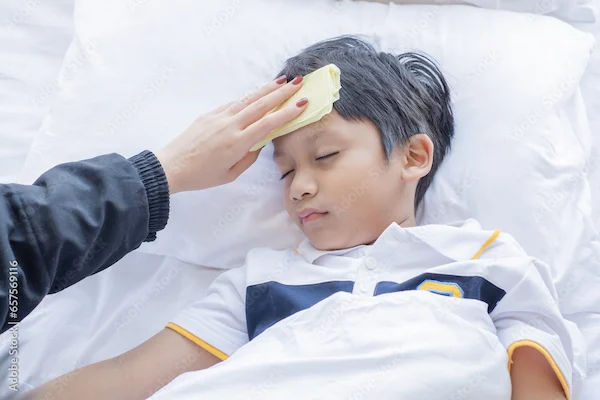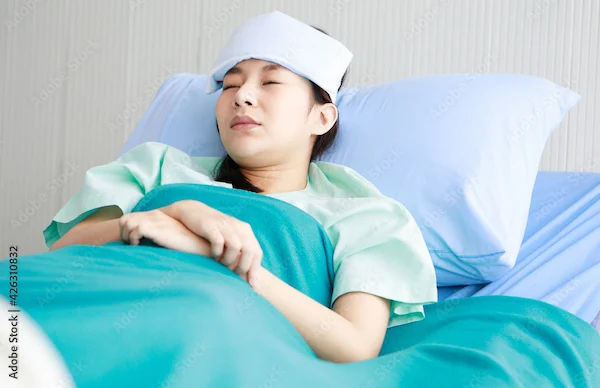Fever Self-Care: Symptoms, Remedies, and Prevention Tips
While fever is a non-threatening condition, taking immediate action is important to keep it under control. Know the self-care tips for it.

Written by
Last updated on 3rd Jul, 2025
Pyrexia or hyperthermia are the medical terms for fever that are associated with higher body temperature than the prescribed normal range. The normal human body temperature range is 97 to 99 degrees Fahrenheit. But, when body temperature rises above 100.4 degrees Fahrenheit, it can be considered a fever. Many people do not know that fever or the heat produced is one of the body’s defence mechanisms against foreign elements. Fever can occur due to innumerable reasons, starting with infections to hormonal disorders and terminal illnesses.
Recognising Symptoms
Fever is considered to be an indication of an underlying disease or infection that has yet to be detected. That’s why keeping an eye on its symptoms is crucial. Some of the common symptoms are –
Chills and shivering
Lethargy and headache
Sweating
Irritability
Dehydration
Loss of appetite
Flushed face with hints of redness
Low urine output
One should consult your doctor for medical advice if:
Fever lasts for more than 3 days
The fever continues even after taking doctor-prescribed medicines
Individuals are experiencing severe symptoms, like painful headaches, continuous shivering, breathing difficulties, and persistent vomiting
Seeking medical attention for fever is important if one has any underlying health condition like a chronic disease or reduced immunity
Individuals are experiencing lightheadedness, dry mouth, and dizziness during fever
Home Remedies for Fever
Certain home remedies can offer comfort from the symptoms of fever and reduce the body temperature. This includes –
Drink lots of water and warm soups and broths
Avoid eating spicy or oily foods
Try to avoid food that can cause allergic reactions
Refrain from highly processed foods
Individuals can also use various over-the-counter medicines, including paracetamols, to reduce body temperature and alleviate aches and fatigue.
Also, patients need to get ample rest to recover faster from a fever. Limiting movement and sleeping helps significantly. Also, they can try and relax by watching movies, reading books, etc., to take their mind off the illness.
Natural Remedies and Alternatives
Natural remedies like herbal teas can help one feel more comfortable and lower the body temperature. Here, patients can use –
Ginger Tea: Ginger is well-known for its immune-boosting and anti-inflammatory properties
Peppermint Tea: Peppermint has a cooling effect, offers relief from headaches and makes people feel rested
Chamomile Tea: Chamomile is an ingredient that promotes relaxation and provides relief
Lemon Tea: Lemon will provide Vitamin C and calm the senses while allowing you to deal with anxiety
Apart from the herbal teas, individuals can also try creating a warm drink using clove, cardamom, cinnamon and basil leaves. They can also use honey to lower inflammation in the body. Drinking warm milk with honey or turmeric proves really helpful.
Besides the herbal drinks, individuals must manage their temperature to ensure the fever does not worsen. Here are some tips –
Applying cool compressions on the forehead and around the neck
Taking lukewarm showers
Dressing in light and comfortable clothing for proper ventilation
Making sure you are covered well (during the winter months)
Increasing air circulation within the rooms
Staying hydrated by increasing warm water intake
Keeping Track Of Fever
Tracking the body temperature and understanding the fever patterns will help individuals determine if they have any seasonal infection from a virus or if there is any undetected health issue that may pose potential risks in the future. To properly measure the fever, individuals can use the following techniques –
Properly read the instructions that come with the thermometer
Wash their hands thoroughly with warm water and soap before using the thermometer
Use rubbing alcohol or a moist cotton swab to clean the thermometer before use
If the patient has taken any fever-reducing medicine, then wait for 6 hours to again take a temperature reading
Along with measuring the temperature, one needs to understand the fever pattern as well. For this, they should –
Take body temperature at regular intervals, like morning, afternoon, evening, and night – or as recommended by the doctor
Keep track of symptoms like chills, shivering, headaches, and body fatigue
Notice if the body temperature is staying high consistently or if there are fluctuations
Lifestyle Adjustments During Fever
Controlling and managing the body temperature in fever and alleviating the symptoms require a few lifestyle adjustments as discussed below –
Limiting Physical Activity: Limiting physical activities during the fever is important. One needs to focus on getting enough rest and sleep to help the body recover faster.
Eating Healthy: Eating nutritious food is important during this period. One must focus on a balanced diet that has vitamins, proteins and minerals to fight off the fever.
Drinking Enough Water: Remaining hydrated is important to deal with fever. So, focus on drinking enough water and individuals can include fruits with higher water content in their diet as well.
Refraining From Unhealthy Habits: During this period, one should not continue smoking and drinking alcohol. Also, limiting the consumption of carbonated drinks is important as well.
Special Considerations
Managing fever in children and older people may require a few more precautions, as their weak immune systems will be more susceptible to infections and allergies.
For managing fever in children,
Check their temperature periodically and ensure the body temperature doesn’t exceed the threshold.
Feed them with plenty of water and liquid-based food for proper hydration.
Do not create a stuffy environment by wrapping them in too many blankets.
Keep over-the-counter paediatric fever-reducing medicines as prescribed by the doctor.
Make them rest and restrict the use of smartphones, TV and other electronic gadgets.
For managing fever in the elderly,
Older people need more rest and should restrict physical movement.
The diet needs to be as light and liquid-based as possible to prevent any adverse gastric problems.
Medications should be administered after a doctor’s consultation, especially if the person suffers from any underlying health issue.
Preventive Measures
There are many causes of a fever, and here are a few precautions one can take to prevent it:
1. Strengthening the Immune System
Eat a balanced diet to strengthen your immune system and avoid smoking and alcohol consumption as much as possible. Regular exercises can also boost the immune power and protect you from fever. Undergoing regular health check-ups will help diagnose any diseases at an early stage and prevent them from becoming chronic, wherein fever is usually the first indication.
2. Hygiene and Infection Control Practices
Maintain appropriate hygiene practices, like –
Washing hands before having a meal
Disinfecting surfaces thoroughly
Wearing a mask in crowded places
Possible Complications of Untreated Fever
If fever is left untreated, it can lead to potential health conditions that could worsen with time. One of the primary complications of untreated fever is severe dehydration, often to the point where the person may require IV shots.
Apart from this, other concerns of untreated fever include –
Seizures
Organ damage
Neurological symptoms like delirium
Excessive fatigue and weakness
Conclusion
Fever is the human body’s natural defence mechanism, and it is often a sign of other underlying health conditions. So, fever requires proper monitoring and medical intervention when needed. However, in most cases, home remedies, a few prescription drugs, and lifestyle adjustments help individuals recover quickly.
Consult Top General Physicians
Consult Top General Physicians

Dr. Vasanthasree Nair
General Practitioner
15 Years • MBBS
Angamaly
Apollo 24|7 Clinic - Kerala, Angamaly
(425+ Patients)

Dr. Md Yusuf Shareef
General Practitioner
8 Years • MBBS
Hyderabad
Apollo 24|7 Clinic, Hyderabad

Dr. M L Ezhilarasan
General Practitioner
6 Years • MBBS
Visakhapatnam
Apollo 24|7 Clinic - Andhra Pradesh, Visakhapatnam

Dr. Lakshmi Sindhura Kakani
General Physician/ Internal Medicine Specialist
10 Years • MBBS, MD (General medicine)
Visakhapatnam
Apollo 24|7 Clinic - Andhra Pradesh, Visakhapatnam

Dr. Suraja Nutulapati
General Physician/ Internal Medicine Specialist
10 Years • MBBS, MD (Internal Medicine)
Hyderabad
Apollo 24|7 Clinic, Hyderabad
(850+ Patients)



